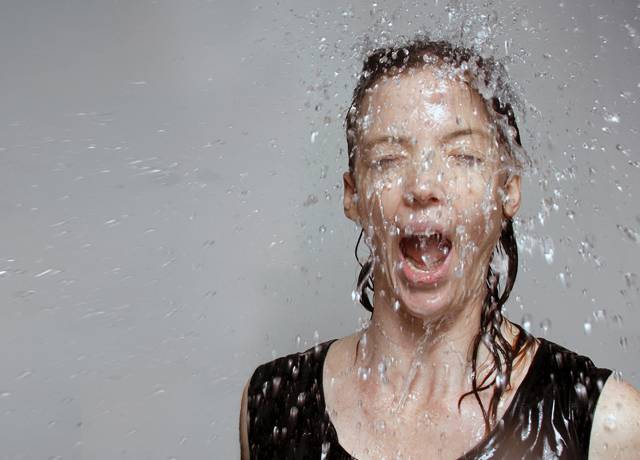
Modern life can get overwhelming with the seemingly unlimited number of options it presents. But how far should you go to escape? This is the question posed by
Raft, a new play by The Group Lab currently previewing its upcoming Edinburgh Fringe Festival run in 59E59 Theaters’ East to Edinburgh Festival.
Directed by Jenna Panther,
Raft is a simple but commanding examination of the realities of a “simpler” life.
The play centers on two sisters, portrayed by real-life siblings Emily and Lisa Kitchens, who eschew modern life’s stresses by living aboard a raft and journeying wherever the river takes them. Tired of decisions and having to “make life happen," they put their faith in “the assuredness of the river and the vessel.” But this passive life is interrupted by a fishing attempt gone awry, as a man (Paul Kite) comes aboard and forces the sisters to examine their life choices (or lack thereof).
Emily Kitchens’ script feels inspired by a river itself in its meandering construction. There’s no rigid dramatic structure or overt exposition here, and we never really learn these characters’ backgrounds or what happened in their lives to inspire such a radical change. Instead, the play blends thoughtful introspection with the mundane details of daily life, interjected with folk songs and banjo music that evoke a nostalgic sense of Americana.
As you'd expect from characters who reject modern society this strongly, the piece has some existential themes, asking if a life directed by the river is really much of a life at all. But the play never gets overwhelmed by the large questions it raises. Actually, the script openly resists letting big ideas consume the play: Characters constantly ask “What are the implications?” of their thoughts but never give an answer, and one sister even asks their male companion to “try to resist the profoundness of things.” Though it ends fairly resolutely, the piece is mostly deliberately clouded, focusing more on small realizations and stirrings of epiphanies than grand conclusions. Much like floating down a big river on a small raft, Raft is vast but constrained in its scope, circuitous but always moving forward.
This loose form makes the play seem more like an authentic experience than a contrived dramatization, which is helped by the universally compelling performances. Both Kitchens bring a punchdrunk exuberance to their portrayal of the blissfully optimistic sisters, which is nicely balanced by the grounded intensity of Kite's performance. There’s also enough room for conflict within the basic premise to keep the audience invested, as an early trip through the rapids gives river life a precarious edge. Yet with the light plot and unfocused structure the play feels a bit long, even at just 75 minutes. Its more mundane or repetitive moments could be tightened, especially given the packed schedules of Edinburgh audiences. But for those lost in the Fringe Festival's sea of choices, Raft’s thoughtful consideration of a passive existence may be the perfect respite.

 Modern life can get overwhelming with the seemingly unlimited number of options it presents. But how far should you go to escape? This is the question posed by Raft, a new play by The Group Lab currently previewing its upcoming Edinburgh Fringe Festival run in 59E59 Theaters’ East to Edinburgh Festival. Directed by Jenna Panther, Raft is a simple but commanding examination of the realities of a “simpler” life.
Modern life can get overwhelming with the seemingly unlimited number of options it presents. But how far should you go to escape? This is the question posed by Raft, a new play by The Group Lab currently previewing its upcoming Edinburgh Fringe Festival run in 59E59 Theaters’ East to Edinburgh Festival. Directed by Jenna Panther, Raft is a simple but commanding examination of the realities of a “simpler” life.